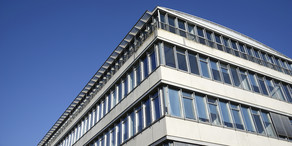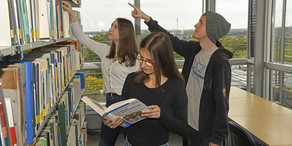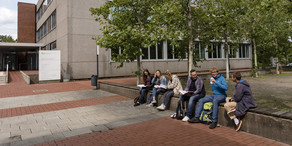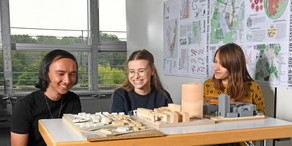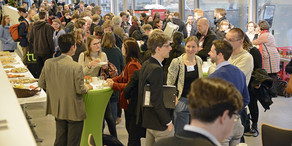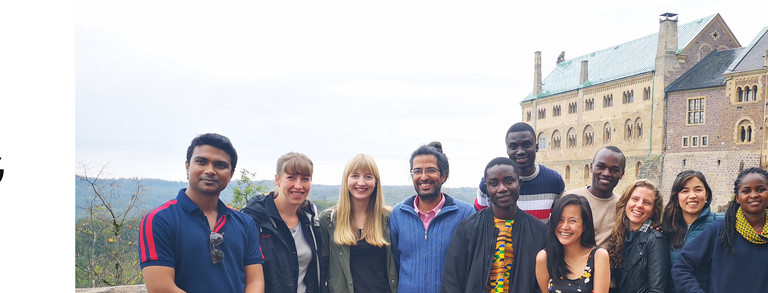Voices about 2nd year
Universidad Austral de Chile (UACh) - Chile
What knowledge and skills have you attained and how would you describe the academic life at the 2nd year institution?
As for an urban planner and designer, I learned more in detail about other social and economic departments and how to work in a multi-disciplinary environment. Another important skill I gained, is learning a new language from scratch. The academic life of the second year was more broadened in the theoretical aspects concerning social and economic aspects and more related to the Chilean system. The other aspect was to experience a real problematic case study that the SPRING students had to practically apply the tools of planning to contextualize the current situation.
How would you describe the campus life including student services at the respective partner university?
The campus life in UACh is very helpful. Internet can be accessed from everywhere on campus. There are several cheap cafeterias and printing places around the campus. Moreover, the library is available with a good working place that can be accessed by everyone until night. Also, the bank and sports facilities are located on campus, so probably one can spend the whole day on campus.
What did you like the most about the cultural environment during your 2nd year stay?
I like Valdivia because it is a small city and everything is accessible in close range. The University has a policy for environmental concerns, so there are a lot of young movements that one can join concerning this aspect e.g. bicycle tours, botanical garden, environmental movements. Overall, I like the Chilean’s interest to learn about other cultures and to listen and share their experience, however it has to be accompanied by improvement of the Spanish skills.
Why would you recommend your 2nd year destination to other SPRING students?
I would recommend Chile as a second year destination, since it has a strong academic base that can give you another view on development studies. The university provides an overview of the Chilean context as well as Latin American experiences in development. For those who are interested in languages, Spanish can be easily learned and improved due to the easiness in social interaction with the locals. Moreover, Valdivia is a safe and friendly city to live in with a lot of cultural identity that can be grasped through time.
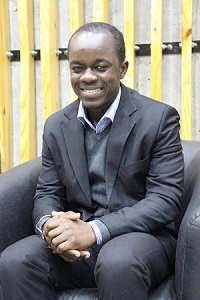
What knowledge and skills have you attained and how would you describe the academic life at the 2nd year institution?
I have gained a lot of knowledge and skills from UACH, Valdivia, Chile. Among these include: “the actor oriented approach” to development from the course Regional development and local dynamics; very insightful knowledge of both quantitative and qualitative research approaches; and Placed based development and economic policies. I also gained practical experience in remote sensing and digitalization in GIS which I had no knowledge of. Last but not the least, I gained a lot of knowledge in planning for urban sustainability, environmental sustainability as well as planning for resilience and sustainability.
How would you describe the campus life including student services at the respective partner university?
Campus life here in Valdivia is very diverse. There are a lot of seminars and conferences from different professions related to and not related to planning which we always get invitations to. There are also a lot of non- educational programs organized for and by students. There are a variety of sporting activities that one can partake in. A good example is the Kayaking and rowing which my mates enjoy(ed) a lot. There are two most important student services for me. The transport card for students reduces transportation cost for buses for movement within the city, if you register yourself for it. The student ID card doubles up as a “credit card” which can be used for all financial transactions within Chile. The SPRING administration in Chile creates and provides an environment very conducive for studying and socializing.
What did you like the most about the cultural environment during your 2nd year stay?
I would say that what I like most about Valdivia is their high level of patriotism and indulgence for the nation, cultural and environmental issues.
Why would you recommend your 2nd year destination to other SPRING students?
I have really enjoyed my stay here in Chile, Valdivia. I would say it was a time well spent especially for a continent and country I knew little about except through the news. The educational and social life are worth experiencing.
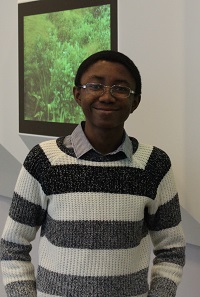
What knowledge and skills have you attained and how would you describe the academic life at the 2nd year institution?
I improved my analytical and writing skills as a result of the papers written in class. I also developed better presentation and communication skills, due to the various class presentations and discussions. The academic life in the 2nd year
destination is unique and different from that of the 1st year because it tries to build more on the theoretical foundations and methodologies than on its applications. The lecturers are approachable and ready to assist the students.
How would you describe the campus life including student services at the respective partner university?
The university provides a good balance between academic and social life including sports and events, study tours, seminars and conferences to ensure a vibrant exchange of cultures and ideas. The campus offers very calm and greenery sceneries, with various facilities such as the library, canteen etc. within walking distances and easily accessible by public transport. The university has a very friendly and helpful staff, willing to assist students and make campus life as comfortable as possible.
What did you like the most about the cultural environment during your 2nd year stay?
What I liked the most was the friendliness and warmth of the people of Valdivia. A variety of cultural events, such as concerts, art exhibitions, carnivals and festivals etc. are organized by the municipality throughout the year to enable residents to
interact and get to know themselves and the city. In addition to that Valdivia offers a vibrant, but safe nightlife that extends into the early hours of the morning.
Why would you recommend your 2nd year destination to other SPRING students?
I would recommend the UACH because of their good theoretical and fundamental teachings, the rich and diverse culture of Chile and the advantage of learning the “Chilean Spanish”.
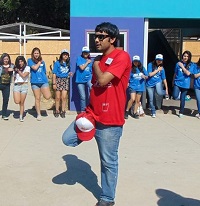
What knowledge and skills have you attained and how would you describe the academic life at the 2nd year institution?
The second year study was highly characterized by in-depth learning on qualitative research methods, natural resources management, and regional development planning and management. I attained from my second year’s study a big knowledge set. It includes qualitative research methods like actor-oriented approach, ethnography and constructivism. Furthermore I acquired knowledge about rural and regional development planning and management, sustainable natural resources management, environmental management and economic instruments in planning. I gained different skills from our study content. People management like managing indigenous, rural people and government officials from the workshop and thesis. Solving problems and thinking in a strategic way were imparted in the workshop. Observation was attained in our qualitative research class. Beside all these studying related skills I learned Spanish.
How would you describe the campus life including student services at the respective partner university?
The campus life has been superb. It wascold and rainy in most time of the year butwarm enough due to the warm behavior of the SPRING UACh personnel. Angela Morales Araya had been a real angel for us,she maintains the meaning of her name! The place where I had been staying got burned down andwe lost everything but SPRING UACh helped us in all possible ways to get back to our normal life.
What did you like the most about the cultural environment during your 2nd year stay?
South Chilean people are very much open to the foreign cultures (except the so called U.S. Gringo culture though). Being from Bangladesh, a country Chilean people never heard of - I was heartily welcomed by all the Chilean people. Besides learning Spanish there were several very important and interesting cultural learning for me. If you cook in a party, you don’t wash the dishes after the party, invited guests do the washing. If you say “hola (hello)” (with little smile) to people while walking, they will come to you from the opposite side; doesn’t matter if you know them or not. Chilean people love interaction with smile. There are two types of party clubs in Chile: One for elder aged people (more than 30 years old, for instance), another for younger aged. Choose which one suits to you.
Why would you recommend your 2nd year destination to other SPRING students?
Firstly, if you are originally from Asia and Africa, please do not hesitate to choose UACh. In one hand you will be loved there by the lovely southern Chilen because you are actually coming from a country of ‘fairy tale’ to them and on the other hand you will be mesmerized to see a totally different cultural environment than your own one. Secondly, for all the SPRING students academically interested in qualitative research, ethnography, sustainable resources management, tourism management, environmental management, rural and regional development and of course earthquake, UACh is the best choice for you.
Kwame Nkrumah University of Science and Technology (KNUST) - Ghana
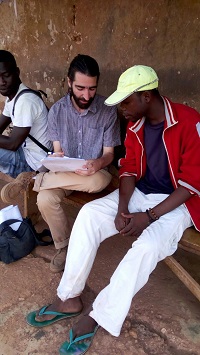
What knowledge and skills have you attained and how would you describe the academic life at the 2nd year institution?
Spring is a life transforming program; especially because of the opportunity to experience a complete change of environment. Ghana offers a very practical experience on planning at the district level. An intense year-long workshop gives you the opportunity to have a broad understanding of the history and current political-administrative system of the country. It also encourages us to research from primary sources, going to villages, making contact with local people, and interact with public officers. Regarding the master thesis, there is a lot of freedom for its development, which allowed me to explore new fields of knowledge and correlate them with local conditions. Because of the multiple backgrounds from the students, we are stimulated to learn new skills sharing our know-hows, but also to put our knowledge from previous experiences and the ones acquired in Germany into practice.
What did you like the most about the cultural environment during your 2nd year stay?
The academic environment is quite different than the ones I experienced before. There are several cultural codes that take a while to get used to, especially regarding the relations among lecturers and students but everyone is interested and very supportive with foreigners. Ghanaian are proud of their local food and attempt to teach and encourage interactions in Twi, the local language.
Why would you recommend your 2nd year destination to other SPRING students?
The cultural and social environment of the city and the country is not so easy to explore, it requires some endeavor to figure out places and overcome some social barriers. However, using the advantage of being a foreigner, the country slowly presents itself as full of possibilities. Therefore, living in Ghana and having a glimpse of the situation of West Africa gives a sense of the enormous complexity and responsibility of the planning field, inspiring in the continuous work of changing the world for the better.
University of the Philippines (UP) - The Philippines
What knowledge and skills have you attained and how would you describe the academic life at the 2nd year institution?
The distinctive value of the second year’s program in SURP is that it is strongly praxis-orientated. All classes are addressed to reinforce conceptual, theoretical or methodological knowledge in every day’s planning life in the Philippines. As a result, the skills attained by the students are mainly; strengthened data gathering expertise (particularly for processes that involved a direct work with official public offices at different territorial planning levels); improved observation capacity during fieldwork exercises; deeper understanding of problem identification and analysis techniques; and enhanced group work skills (all classes required group project exercises).
How would you describe the campus life including student services at the respective partner university?
The UP-Diliman campus is a big green open area with nice places for leisure activities (the only one available in the city in many kilometers around the university). However, not many extra-curricular activities are offered for the students. Or those offered are subject of additional costs (quite expensive). SURP in particular is a very small building, with poor facilities. A new building will be inaugurated soon, which will surely improve students’ experience. SURP lacks a broader academic offer besides the regular academic plan.
What did you like the most about the cultural environment during your 2nd year stay?
The Philippines is a unique country in the Asian context because of the mixture of Spanish and (diverse) Asian’ ethnical and cultural heritage; in the context of a society very influenced by the USA legacy. It makes the experience here unique compared to other countries in the region. It also has an impressive nature to offer and the people are incredibly generous and kind.
Why would you recommend your 2nd year destination to other SPRING students?
I would recommend SURP for people interested in analyzing some of the mega-cities of our century, in the context of a country with major challenges in the provincial areas. From the point of view of planning and governance it represents a real challenge (hundreds of small islands with different problems to be addressed). It is a good place to reinforce English speaking skills.
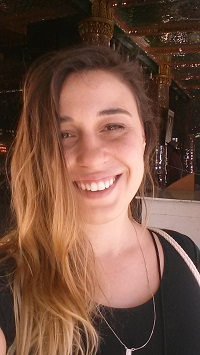
What knowledge and skills have you attained and how would you describe the academic life at the 2nd year institution?
The School of Urban and Regional Planning at the University of the Philippines was founded in a partnership with the UN and still nowadays disseminates much of the development values throughout their courses. There is a broad range of subjects to focus your studies on, not only during the formulation of your theses but especially on the workshops in real life situations.
How would you describe the campus life including student services at the respective partner university?
The campus is a fresh green area to escape from the concrete jungle of Manila. The dorms are humble and shared, but there are plenty of fancy apartments in the campus’ surrounding where you can choose to live. The university staff is also very kind, and the fact that everybody speaks English is a blast! However the bureaucracy in all school matters will demand a lot of your personal patience.
What did you like the most about the cultural environment during your 2nd year stay?
You will have classes together with Filipinos students, which is great to get immersed into the local culture. They are very welcoming and will be happy to assist you on getting over any challenge on getting used to your new routine.
Why would you recommend your 2nd year destination to other SPRING students?
I would recommend the Philippines for those who want to experience a hot fun country that offers a good perspective for all development issues.
Ardhi University (ARU) - Tanzania
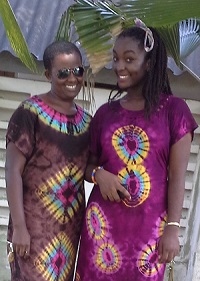
What knowledge and skills have you attained and how would you describe the academic life at the 2nd year institution?
My second destination on the SPRING program was in Ardhi University, Dar es Salaam Tanzania. The academic experience there was similar to what I was used to in my own country Ghana. At the end of this 2nd year, I had attained a good level of knowledge of how effectively plan our cities and regions with the available scarce resources. Academic life at Ardhi is very engaging. During the first semester when the course work is done, there are lots of texts and assignments which keep the student reading and researching. The students get used to the habit of doing so much within a short while, effectively and efficiently.
How would you describe the campus life including student services at the respective partner university?
In terms of campus life, I would say it was quite not as comfortable as it was back in Dortmund. However, coming from a developing country myself, I understood how imperfect the system could be. Student services were not as organised as the German case. Sometimes, my colleagues and I had to muddle through situations to get the ‘near-expected’ results. For me, that experience has really made me resilient in my current working environment. I would say it is a place to build strong bones and muscles figuratively.
What did you like the most about the cultural environment during your 2nd year stay?
Culturally, Tanzania was quite a home away from home, I would say. Even though the People speak more Kiswahili than English, it is rather more common to find an English speaker than you would find in Germany. Food! It would probably shock you (especially if you are West African) the kinds of food you would first experience, but as you settle in, you would find variety to enjoy. Also, expect beautiful BEACHES that would make you nostalgic when you leave for your home country. In any case, transportation is a bit messy; not as organised as the German system.
Why would you recommend your 2nd year destination to other SPRING students?
For all the above-mentioned mix of good and seemingly unpleasant situations, I would recommend Tanzania as second destination country to SPRING students. I believe the outcome at the end of the year is a good blend of academic and non-academic experiences which would be with you forever!
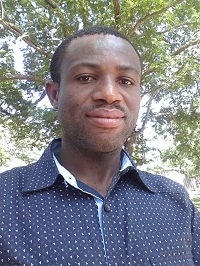
What knowledge and skills have you attained and how would you describe the academic life at the 2nd year institution?
Academically, the second year imparted me with knowledge of urban planning. I was introduced to the basis approaches for strategic planning and how to deal with urban informalities (spatial and economic informalities) through the Urban Planning Studio. The Studio work exposed me to how to deal with petty traders (informal traders) and informal settlements in a practical manner. Through the various modules, I gained exposure to issues of urban land management in developing countries, Urban Planning Theories etc. The theoretical work was also very useful to have broaden my knowledge on urban issues owning to previous educational background (Community Development Practitioner). I can now adequately and appropriately manage urban and rural development planning issues through the knowledge I have acquired. Academic life in Ardhi University is quite complicated, though the structure of the program is good. The requirements of the program are very high. We are made to write two tests and two exams for each module taught, and at the same time still write final semester examination. The workshop/studio is completely imparting but usually run concurrently with the modules’ tests and examinations, and the research dissertation. This makes it difficult to be concentrated all the time and having effective discussions.
How would you describe the campus life including student services at the respective partner university?
Compared to TU Dortmund, services for students are generally poor. Students are responsible for arranging their residential permits, hiring or paying the cost of transporting themselves by a private means to the studio/workshop communities and regions for data for the studio/workshop reports preparations. Students’ registration is very cumbersome and can take more than a month for SPRING students to be registered (particularly in our case). Attaining residential permission from the immigration office is the biggest headache though it is the major required for students’ account opening in all banks. You need to schedule enough time for its application. Students are not allowed to prepare food on campus, students on campus buy food from the cafeterias at a very affordable price. The campus has libraries for students however the delay in gaining access to student ID Cards acts as the barrier to accessing books in the library. Lecture times are very flexible, students only need to negotiate with the lecturer concerned on the time they feel is suitable for the lecture to be held (particularly in our case).
What did you like the most about the cultural environment during your 2nd year stay?
The major things I like so much have been “Chapati” local disk usually taken for breakfast, fruits and the locally prepared juice. The environment is also very friendly but you need to know the Tanzanian currency else you will be cheated in monetary transactions in the local markets. Transportation within the town is relatively cheaper.
Why would you recommend your 2nd year destination to other SPRING students?
I will recommend Ardhi University to any SPRING students who have a strong focus on learning urban planning and management issues. With such burning desire such student will be able to pursue the program regardless of the complication she/he will face. The program is knowledge enhancing and will completely improve your understanding and interest for urban planning issues pertaining to developing countries. I found it a suitable program despite the complications bedeviling learning environments.
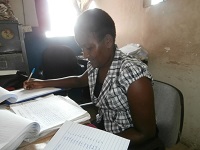
What knowledge and skills have you attained and how would you describe the academic life at the 2nd year institution?
My stay at Ardhi University in Dar es Salaam; Tanzania was interesting. First and foremost, despite the fact that I speak Swahili language, it was a bit difficult to communicate with the Tanzanians in Swahili. The Swahili spoken in the country is a bit different from what is spoken in Kenya. All the same, the university exposed me to a number of skills and knowledge which I appreciate to date. For sure, Tanzania Ardhi University is an academic institution. The program was organized in a manner to promote learning only. Socialization and travel for adventure was involved subsidiary. There were lots of Continuous Assessment Tests and examinations.
Team work: We prepared a land use plan for Bashnet town as a group. Every member was assigned a task. However, marks were awarded according to the effort each member contributed as opposed to collective marking scheme.
Technical skills: The Bashnet town Development Plan exposed me to a number of technical skills. The adopted planning process and approached methodology was very instrumental.
Knowledge: The modules about Urban Land Management and Planning were very educative. Much appreciation goes to professors Kombe, Kyessi, Lupala.Dr. Lupala ensured inexhaustible that I understood all the concepts. Prof. Kombe used a very nice teaching approach whereby he never referred to any material while teaching because he had captured and internalized the concepts. He posed questions to us often; this made me alert all the time lest I failed to answer his questions. His sense of humor summed it all.
Dissertation skills: I appreciate that the thesis/dissertation writing period was educative and fun. I never would have guessed handling such an elaborative research. Time given for the research was sufficient enough. Prof. Kyessi and Dr. Lupala supervised me throughout the process, I want to give thanks to all of you. The acquirements through this exercise is right now very useful at my work place.
How would you describe the campus life including student services at the respective partner university?
Life at the Campus was fun and boring. First, the accommodation is very poor. The student rooms are small and there are restrictions of using facilities. Students are not allowed to cook in the rooms. This was very challenging given that the campus canteen had only a small variety of food. We had hardly any time to enjoy and participate in social events within the campus. Most of our free time was spend doing home works and reading for exams, this is because of the priority given to books by the program. In contrast to our time in Dortmund no student assistants were assigned to us. We had to learn organizating things by ourselves. That was a big conversion as compared to the first year in Dortmund.
What did you like the most about the cultural environment during your 2nd year stay?
It was a cultural shock to restrict students on dress code. I was surprised that short dresses/skirts and sleeveless tops would not be worn within the campus compound. Actually, Dar es Salaam is a hot city hence I would expect the prohibited clothing to be the one been advocated for. Coming from East Africa region; Kenya, the rest of do’s and don’t’s seemed okay for me.
Why would you recommend your 2nd year destination to other SPRING students?
I would recommend Ardhi University to those looking forward to serious studying. If you like traveling and adventure, rather prefer another university but not Ardhi.
Universidade Federal do ABC (UFABC) - Brasil
What knowledge and skills have you attained and how would you describe the academic life at the 2nd year institution?
The classes at UFABC are conducted by amazing professors, who are available to introduce and include us at their research teams and laboratories, as well as to provide aid in our own researches. The disciplines are focused on governance, concepts regarding public policies that are a differential in relation to other spatial planning courses. Getting to know the reality of spatial planning and policies in Brazil, and sharing our experiences in other countries is a valuable part of the curriculum, and professors will do their best to integrate the concepts presented and different contexts in our thesis.
The main positive point of the academic life in UFABC are the people - Brazilian students open to share their research with you and introduce you to their studies, professors who are curious about our experiences as international planners and that elaborate inclusive classes and a caring team. These relationships can help your research and will support you to grow as a student, with the possibility to participate in research groups, write articles and attend other academic events.
How would you describe the campus life including student services at the respective partner university?
In general, students, professors and other workers in the university are very open and will do their best to communicate even if they don't speak English. The university is equipped with places to study, such as the library, cartography laboratory and classrooms, as well as places to spend time and meet people, such as the university restaurant (with a friendly cost for students) and open spaces. The university bus is essential to students who have classes in both campuses, or that reside near Santo André, giving access to the train station, and other services surrounding the university, such as bars, supermarkets and restaurants.
Overall, the services are good and easy to access, and there will always be opportunities to get involved in activities inside the campus, such as sports and student gatherings.
Why would you recommend your 2nd year destination to other SPRING students?
I would say that Brazil has a unique culture, and characteristics that all students would appreciate, not only regarding the friendliness of the people, but also in the ways we do spatial planning and public policy. The second year at UFABC is an opportunity to get in touch with new practices and immerse yourself in different types of disciplines and researches. The classes are held with very few people, being the perfect environment for debates, and to integrate yourself in the researches going on in the university, participating in student groups, specially with the support of your advisor. I would recommend that, if you come, take advantage of this inclusivity, and share your experiences with other academics, exchange knowledge with the professors, take part in student activities, and be open to the particularities that Brazil has to offer.
What knowledge and skills have you attained and how would you describe the academic life at the 2nd year institution?
I selected UFABC in Brazil for my second year of study, drawn by its prestigious reputation and the invaluable chance to immerse myself in a different global locale. The academic year was divided into trimesters, each had different courses about Public Policies, Methods & Techniques in Territorial Planning & Management, and Sustainable Development in the Global South. These courses provided me with insights into analytical perspectives within public policy theories, methods for analyzing both quantitative and qualitative data, and diverse challenges surrounding sustainable development.
Additionally, the Workshop to discuss and share thesis progress provided a collaborative environment where I could present my research ideas, receive constructive feedback, and engage in discussions with peers and department. This experience significantly honed my research skills and contributed to the refinement of my thesis. UFABC has several research labs such as LEPUR, LAPLAN, LABJUTA, among others. We were introduced to these labs and their department members, facilitating our selection of a lab and thesis supervisor aligning best with our research interests. This supportive environment and being a part of LEPUR greatly reinforced my research.
The academic setting at UFABC was both intellectually stimulating and dynamic. Witnessing ongoing projects within these labs, focusing on practical applications, enabled me to bridge theoretical knowledge with real-world issues in my research.
How would you describe the campus life including student services at the respective partner university?
One of the highlights of campus life at UFABC was the Refeição Universitária (RU), where I liked good subsidized meals. The RU was a go-to spot for me to meet and socialize with other students over food. We had the integrated ID card that was used for everything, from entering the university, to the RU and for the Inter-Campus Buses that eased mobility between campuses. The campuses felt inclusive and welcoming, with a conducive environment for both study and relaxation.
The International Office played a crucial role in ensuring a smooth experience for me. When my visa was approaching its expiration mid-course, the university provided invaluable assistance with the visa extension process, guiding me through the necessary steps. One could also join free language courses offered at UFABC. Having learned basic Portuguese definitely made my life easy within the university and in daily life in Brazil.
What did you like the most about the cultural environment during your 2nd year stay?
What I found most enriching about the cultural environment was its vibrant diversity. Didn’t know that Brazil had such a rich blend of indigenous, African, European, and immigrant influences and how it has shaped everything. Traveling to different places allowed me to experience some of its cultural tapestry through music, dance and cuisine from diverse regions and backgrounds. Immersing myself in Brazilian music such as pagode, MPB, samba, and forró was particularly enjoyable.
What truly made my stay exceptional was the warmth and openness of the Brazilian people, who welcomed me into their customs and celebrations. Whether I was attending Carnival, exploring different parts of Brazil, relaxing at a boteco (bar), or savoring local cuisine, each experience deepened my appreciation for Brazil's cultural richness and diversity.
Why would you recommend your 2nd year destination to other SPRING students?
If you have a keen interest in public policy or urban governance and are from Asia, I highly recommend UFABC. University courses provide invaluable academic insights. Moreover, UFABC's diverse research labs, coupled with its easy accessibility to professors, foster a rich and collaborative academic environment. The support for international students and inclusive campus amenities enhances the overall experience.
Beyond academics, it offers an opportunity to live and experience living in Brazilian culture firsthand. From exploring cities with diverse contours and climates to participating in traditional celebrations like Carnival, my experience was enriched by the warmth and hospitality of the Brazilian people.
Choosing UFABC not only expanded my academic horizons but also offered a culturally enriching experience that I enthusiastically recommend to others. If you're ready to embrace learning another language after German, UFABC is undoubtedly a rewarding choice.





